Chris Baty's Blog, page 40
April 7, 2021
NaNo Interview: 2021 Camp Designer Monique Steele

Camp NaNoWriMo has begun! You may have already seen some of the cool new subway-inspired merch available in our store.
Today, we’ve interviewed graphic designer Monique Steele about her design process for this project:
A: My first step when approaching a new design concept is always research. I play a game of word association in my head, and when the first things come to mind relating to the concept, I start saving pictures and watching videos to gather inspiration for how to approach the design. A lot of times the initial thoughts I had about a concept are completely thrown out the door as more research reveals a new way to look at the piece or a new angle to approach from.
Then from there I do quick sketches to pull together the ideas I’ve come up with. Sometimes the thumbnail sketch process goes really quickly. Some ideas at this point are more concrete than others and are just so easy to visualize, other times they’re a bit harder to nail down so I end up having to do a million different sketches before I’m satisfied.
Once I, and the client, choose which direction to take the piece, it’s a process of constantly refining the sketch. I’ll draw a tighter sketch in a much bigger format and then go over that with clean line work, making sure that things like perspective or the dimensions of elements within the piece work visually. Depending on whether I decide to take a more painterly approach I might skip the tight line phase and use color to carve out the shapes and forms within the art, but the final phase either way is usually using color to bring everything together.
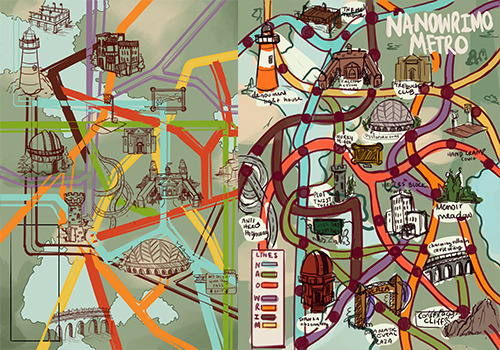
Image: Work-in-progress versions of the 2021 Camp NaNoWriMo “Choose Your Line” poster, showing a colorful subway map with destinations like “Dramatic Reveal Plaza” and “Theme Harbor”
2. Do you have any daily drawing/creative habits that help you with your work?A: I’m always constantly drawing/ painting and creating art when I can. It’s fun for me to have this form of a creative outlet and to play with ideas that live mostly in my head. I also have found it to be a great way to experiment with different methods of making art and to practice techniques that I’m not as skilled in without the fear of “messing up.”
As a digital artist I have also found working in other more traditional mediums has helped me push my digital work in new creative directions. For instance, when I first started digital art I was very dependent on line work to create an illustration, and now after playing more with watercolors and gouache paints I’m much more comfortable working without lines in my digital work. While the personal drawing time is incredibly useful and fulfilling for me in becoming a better artist, I also find taking time away from visual arts to be just as helpful. Taking time to pursue other interests allows me to recharge and also fills me with numerous new ideas for when it comes time to create once again.
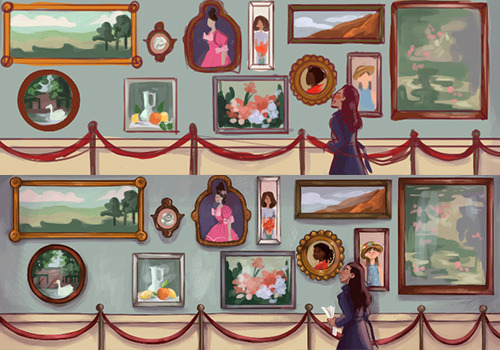
Image: Work-in-progress and finalized versions of the 2021 Camp NaNoWriMo sponsor banner without text. The image shows a woman looking at many framed paintings on a wall in a museum.
3. Has there ever been a point (either with this project or another) when you’ve felt like you’ve run out of ideas for a design concept? If so, how did you get past that point?A: This is definitely a thing I have experienced while working on this project and on numerous others. I find the thing that has proven the most helpful for me is to stop trying to push through the artist block and instead turn to sources of inspiration. Those sources for me can span from other art that I enjoy to watching a film or show or even just going to a different environment.
Sometimes feeling inspired and then returning back to the research phase of the process helps trigger an idea that turns into a full blown illustration. With this project I found myself stuck with the ideas for the illustrated social media banners. Living in NYC I decided to just take a train somewhere for the day to see if inspiration would hit. By doing that and using Google Maps I started thinking about street views of locations, and low and behold the social media banners were born. A lot of times breaking through the art block is about giving yourself some distance from the work to recharge. It may seem counter productive, when under deadline but I’ve found it to be the fastest way to have a break through.

Monique Steele is a graphic designer based in New York City. She is a Jamaican born illustrator, part time Power Ranger, and all-around cool person. Follow her on Instagram, Tumblr, or Twitter.
April 6, 2021
"I like to view writing a first draft as a robust outline. It’s the space where I commit all my ideas..."
-

Nicole Glover works as a UX researcher in Virginia. She believes libraries are magical places and problems seem smaller with a cup of tea in hand. Her life outside of books include bicycles, video games, and baking the perfect banana bread.
The Conductors
is her debut novel.
Your Camp Care Package is brought to you by Camp NaNoWriMo. Sign up to receive more Camp Care Packages at nanowrimo.org!
April 2, 2021
You Can’t Spell ‘Community’ Without U and I
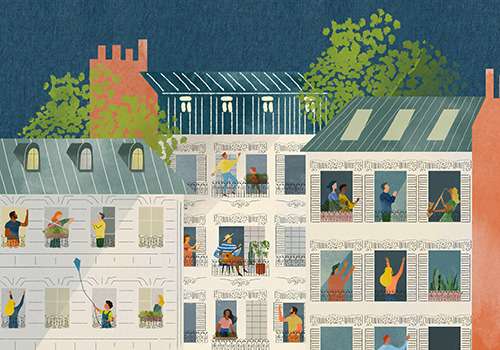
In an era of unprecedented isolation even for those of us who find ourselves drawn to solitary occupations, NaNoWriMo veteran Ali Gallo offers some sage advice about the possibility and importance of staying connected despite the obstacles.
I thought I’d go with a particularly naff title to get your attention.
This time last year I wrote a blog about writers and the importance of community and I called it ‘The Loneliness of the Long-Distance Writer’ which was a much better title. At that point the world had just started down the slippery slope of Covid and the whole idea of building a community was something that we needed to think about because we were going to be stuck at home for a whole two weeks with (or without) our nearest and dearest.
A year down the line most of us are still in the same position and I’ve run out of clever and quirky titles to express how it feels to be a writer in these strange times. Over this year we’ve all become painfully aware of the importance of having a community not just to keep us motivated but for our mental well-being in these times of stress and uncertainty.
On the plus side, I have been more sociable this last year than ever before in my life. I’m part of various online writing groups that I can turn to when I want to share my writing or just have a good moan about life, the universe and everything. I have even been known to get up at 3am here in Malaysia to join a reading night Zoom with my playwriting group in the UK, and I haven’t been awake at that time for years—not since I was a teenager and dinosaurs roamed the earth.
Even for someone as unsociable as me, it’s become obvious that we need that human connection and to know we’re not alone. Writing can be a solitary pursuit at the best of times, and this is far from the best of times. This is why whether it’s a collective writing challenge or a group where you can swap ideas and critique work, we all need to be part of a community.
As humans we are naturally happier and healthier when we interact with others, and as writers we feed off people-watching and creative feedback, all of which are hard to come by at the moment.
The right community will support you, challenge you, and keep you motivated. They will be there to commiserate when you’ve had a bad day and your writing seems only fit to line the cat’s litter box with. They’ll also be there to celebrate when you get good news such as your book being published, your play being performed or even just that you completed your word count for the day. We all know it’s hard enough to sit down in front of that blank page or screen and create something new but without people in your corner it becomes almost impossible at times.
There’s also something remarkable about being part of a worldwide community of writers. I like that I can check in with my friends in America to see how their writing day went or is going and I make sure to check my emails and messages when I wake up to see what my UK writing group has to say about things.
Having said that, I am just getting to know a local writing group here in Malaysia, which is small and very much locally-based but no less supportive or encouraging.
You just have to find what works for you, what you’re comfortable with, and what makes you feel supported and valued.
Community is important to everybody and this year has proved that beyond a doubt; I’m not alone, and neither are you – remember that. I hope that whatever and wherever your community is, it is your happy place. I hope there’s just enough critique, support, and friendship to fuel your imagination and keep you coming back for more.

Originally from Scotland, Ali lived in Africa and now Malaysia – which has taught her that reliable internet, electricity, and good cheese are luxuries not to be taken for granted. She writes blogs, plays, short stories, and shopping lists but not necessarily in that order. With a trilogy of novellas on Amazon (thanks to NaNoWriMo and a family that leaves her in peace to write) she is currently working on her first full-length book when not distracted by shiny objects. You can read more from Ali on her blog, Love the Sky Ur Under!
Top image licensed under Creative Commons from United Nations (artist: Catherine Cordasco) on Unsplash.
March 31, 2021
Camp NaNoWriMo Begins Tomorrow!

Camp NaNoWriMo starts tomorrow! (Or, for some of you in early time zones, it may already be here!) Wherever you’re at right now—whether you’re looking forward to diving into a new writing project, building a community of supportive and creative friends, or just spending some time in the world of your imagination—Camp NaNoWriMo’s got you covered.
We’re here to help you lean into your creativity as you explore, process, and create the stories that only you can tell. If starting a Camp project this month feels a little daunting, don’t worry— you can set a goal that feels good to you, and you can change it as many times as you need.
Announce your Camp NaNoWriMo project today! What’s Happening at Camp?Get Your Writer Flair — Tell the world you’re writing this month by downloading and sharing these beautiful social media images by artist Monique Steele!
Join a Writing Group — Writing Groups are private groups of up to 20 people on the NaNoWriMo website where you can chat with other writers. Start your own Writing Group or find one to join on the forums!
Meet your Camp Counselors — Every year, we get a fantastic team of published authors to act as your guides, cheerleaders, and mentors during each Camp NaNoWriMo session. Meet your April 2021 Camp Counselors during our #CampNaNoAdvice tweet chat on Friday, April 16, 1:00 PM PDT (Your Time Zone).
NaNoFinMo Resources — Our newest track for April’s Camp NaNoWriMo session is jam-packed with fin-tastic resources to help you finish your novel.
Take a Look at Our Sponsor Offers — Every year, we’re lucky to have great sponsors for our nonprofit events. Browse their exclusive discounts and special offers for Camp NaNoWriMo participants!
March 29, 2021
Creating Your Story Waypoints
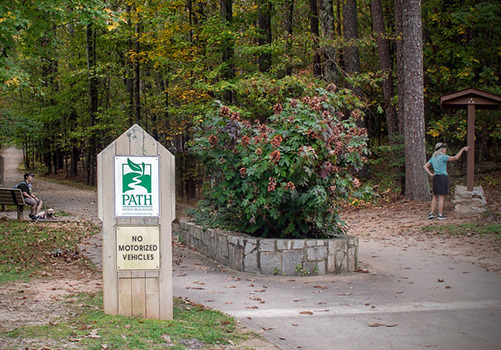
It’s almost time for Camp, so what should we be doing to prepare? Long-time NaNoWriMo participant Franklyn Hudson brings us some practical tips from the writer’s group she runs to help us structure our approach and set us up for success!
At the start of any NaNoWriMo journey I find myself with blank page anxiety. While the ideas may have been rattling around in my head there’s often nothing concrete for me to start with. So, what I do is have a few key questions to answer about my story. These answers help get me hyped up and excited about the journey. These can be useful whether starting a new manuscript or diving back into an old one.
The ConceptWhat excites me about my story idea? (Or stories in general if you don’t have an idea yet!) Be specific– i.e., I‘m excited by stories that have pirates! This is why you want to write this story after all. The things that churn in your brain and offer you the burning feeling that you have to get them down on the page.
What would you pitch as a comparison? (E.g. Lord of the Rings meets The Little Mermaid.) This is a great indicator of the tone and aesthetic that you want to achieve.
Why do we care? What makes your story worth telling?This is the burning heart of the story. It might be the key component of what makes the story tick. It might be the thing you wish to share or bring to light with the story.
Quick and Dirty OutlineWhat is the first image in your story?For me this offers an indicator of the overall feel of my story. If I have this in advance, I find it’s a great entry point to the rest of the story, especially if I have only a few key ideas or vibes about what the story is.
What does this image tell us about your protagonist?The first place we find our protagonist is the place that usually tells us the most about them, so we should keep that in mind and consider aspects such as: might it be a place of safety? Or a place they visit frequently?
What is your inciting incident?This is the key to changing from ‘normal’ to the world of the story.
How does your Protagonist react?We learn a lot about a character by the first major choice they are forced to make, and it can be useful to come back to this moment at the end of the story to show how your character has grown.
What is the key incident in each chapter that drives the plot forward?This creates a very simple skeleton that gives a clear picture of where your story is going.
Wrapping UpI hope these questions give you a helpful way to consider your story. But it is also crucial to remember that first and foremost, before we write for anyone else, we are writing for ourselves. If we can’t maintain love and interest in our story, then our future audience won’t either. This doesn’t mean loving every step of the process, every word, every edit, every page — because the odds are that you won’t. As well as being your first reader, you are often your first critic. What it means is that you use those moments when you find yourself struggling, when your writing is lackluster, as signs that you are going the wrong way. I hope these questions give you waypoints to find in those times, lights in a storm to guide you along your journey when it is at its most rocky.
Good luck!

Franklyn has been participating in NaNoWriMo events since 2011 and is an aspiring author. In their spare time they like to read, and obey the whims of their two very demanding cats. They can be found on twitter @Sparky2036 or instagram @jeciru!
Top image licensed under Creative Commons from Cizauskas on Flickr.
March 24, 2021
HQ 2021 - Racial Equity Strategy - Google Drive
NaNoWriMo staff spent the first months of the year auditing and revising our organizational racial equity strategy. We invite you to review our current tactics (including where we stand on them) and foundational context at the link.
In the interest of transparency and accountability, we also wanted to share our 2020 accomplishments—with the acknowledgment that we still have much to do:
Implemented DEI landing page, with regular updates.Created ongoing internal systems and assessments for staff commitment to racial-equity work.Planned ongoing knowledge-building and discussion opportunities around racial equity, including a regular DEI reading group.Maintained BIPOC as majority of annual interns; increased hourly rate to $18 based on living wage audit.Maintained BIPOC as majority of paid contributors; audited and increased pay scale.Contracted BIPOC merchandise designers for NaNoWriMo 2020 and Camp 2021.Added BIPOC members to the Writers Board.Elected a Latinx chair to the Board of Directors.Shared DEI strategy and resources with volunteers and community spaces; audited results.Completed initial site accessibility audit and prioritized necessary improvements.Implemented enhanced, equity-based forums moderation standards.Implemented new, equity-based processes for staff and participant feedback in web development priorities.Dedicated time in weekly editorial meeting to plan and evaluate racial-equity messaging.Added ongoing section in monthly newsletter, dedicated to racial-equity messaging and resources; audited results.Prioritized the boosting of anti-racist causes, organizations, and resources on social media; audited results.Partnered with PEN America on a prison writing program, and We Need Diverse Books on webcast programming.Piloted a Young Writers Program student publishing project, to be built out for Title 1 schools.Added racial-equity text to sponsorship materials to encourage alignment by our financial supporters.Enhanced 2021 budget for DEI initiatives: $10,000 for internal resources and training; $10,000 for Spanish translation of Young Writers Program materials; $5,000 for contributions and partnerships with DEI-based organizations; $5,000 for BIPOC writer support.If you have feedback or questions, please share them publicly or reach out to us. Thanks to our community for supporting and engaging with this continued work!
March 22, 2021
Tips on Finishing Your Novel from the NaNoWriMo Writers Board

Do the characters in your unfinished novel haunt your dreams? Does your incomplete story call your name from its dusty place in your “drafts in progress” folder? Introducing #NaNoFinMo (National Novel Finishing Month)! Our newest track for April’s upcoming Camp NaNoWriMo session is jam-packed with fin-tastic resources to help you finish your novel.
We asked our talented Writers Board to share some tips for finishing first drafts. Read on to discover what these authors have to say!
Sarra CannonAya de LeonSometimes what holds us back is that all we can see is this huge gap between the sucky draft we think we’ve written and the masterpiece we want our novel to be. Stop looking at the gap and thinking about how impossible it feels. Instead, take it one word, one scene at a time. Finish it piece by small piece. Each step of the way, a little bit more of that masterpiece you’re writing will reveal itself. I promise. There are things about your novel you can’t see from where you’re sitting, but a few steps forward and suddenly, there’s a bit more clarity. Stop expecting yourself to make an impossible leap, and instead, show up every day and take a single step forward. You can do this.
Susan DennardOne step at a time. I start by going through my draft and finding all the places where I wrote things like “DESCRIBE THE CAFE” in all caps. Once I’ve filled in the gaping holes, I read it through the whole book and edit the things that seem off. If there are bigger issues that seem to need work, I keep a separate running list of those. Then I go back and address those bigger issues. Then it’s time to get someone to read it, to see what it needs next!
Grant FaulknerDon’t worry if your ending—or your middle or your whole book!—is a mess. Revision is the next step of the creative process, no matter what, but you can’t revise what you don’t have! So just get words down and worry about making them good later.
Mignon Fogarty
The irony of the moment when you think about giving up on your novel is that it can also be a moment that’s ripe with opportunity if you just keep going. After a lapse, it’s important to forgive yourself, readjust your goals, and give yourself a fresh start so that a bad week of writing doesn’t lead to a bad month of writing, which then turns into a bad year of writing. I pick a “milestone day”—the first day of a new month or a new week—and start again. It’s all about designing your life around the things you rationally want to achieve instead of sinking into the powerful claws of more impulsive needs (such as quitting).
Life goes by too quickly to wait for next year or our next novel. I don’t want to die with a list of all of the novels I wish I would have finished. The main thing about any achievement isn’t necessarily starting it, but restarting it over and over again.
Kami GarciaFind someone who will hound you mercilessly until you finish.
Hugh HoweyEven if you only write one page a day, at the end of the year you’ll have a book. Books aren’t written in first drafts. They’re written in revisions. But you can’t revise unless you finish.
Mary Robinette KowalIf you are having a difficult time finishing your novel, try writing the final chapter! Too often, we get lost in the middle of our books, unsure of where we are heading. Create that final destination, then go back and write scenes that get you a step closer. Don’t worry, you’ll clean it all up in the revision process. The important thing is to have a rough draft with a complete story.
Mur LaffertyI always bog down at about the ¾ mark, when I’m switching modes from opening questions to closing them. Now I treat that as a feature, not a bug, and take time to reread what I’ve written. I make notes of major dangling plot threads and then start giving my main character some wins as a way to start tying up threads.
Devi S. Laskar
The first badge of a writer is writing an awful lot. NaNoWriMo winners have done that. But the next badge is finishing something. Storytellers of old didn’t just get up from their campfires in the middle of their stories and wander into the woods.
Or, pithier:
You’re not a storyteller if you don’t finish your stories. Don’t be a Storyte
Marissa MeyerAlas, it involves math! Make a list of all the items you have left to write (scenes, bits of dialogue and/or description) to complete a draft and then divide by thirty. Then you will know how many you have to tackle each day for the month. The keys are to keep the goals small (doable) and to set aside a bit of time to do these tasks every day!
Emily X. R. PanRemember that it’s okay to skip scenes, chapters, even whole sections! If trying to write the middle of the book has put me in a slump, and I’d rather jump straight into the big, exciting finale, I’ll do it. Once I’ve hit “the end,” it helps motivate me to go back and fill in those empty spaces.
Truth or dare! I’ll go first.
Truth? Okay: Even as a professional author, every novel I write is a terrifying new challenge—I never know if I’ll reach the end. But I do know that the books I don’t finish are never going to be published.
As you might have discovered in November, it’s about figuring out how to keep going.
Here’s how I fight the overwhelm: Stop worrying about the whole book. Break it down into bite-sized pieces. Can you just write the next paragraph? Can you just write for fifteen minutes?
Do it today. Do it again tomorrow. Do it the day after. I dare you.
March 18, 2021
NaNoWriMo Social Media Survey 2021
Social media is an ever-evolving space, and NaNoWriMo shares a lot of content across many platforms. We want to make sure our content and platforms are meeting the needs and wants of our participants to help them tell their stories. Tell us what you like and what you want to see more of from NaNoWriMo by taking this quick survey!
We’ll ask you a little bit about yourself to help us understand how platform use is connected to demographics, and then we’ll ask you a few questions about how you use social media. SurveyMonkey estimates this survey will take about eight minutes.
March 15, 2021
Would You Like to Write for the NaNoWriMo Blog?
No one knows NaNoWriMo like the people who participate! We’re looking for Wrimos to contribute to our blog for some upcoming series.
Interested? Just fill out this form, and we’ll get in touch if we think you’re a good fit! (Please note that we receive a high volume of interest in writing for the blog, and may not be able to respond to everyone. This is currently an unpaid opportunity.)
Are you a Young Writers Program participant? Fill out this form instead so we can make sure that we attribute you correctly!
March 10, 2021
Meet Our New Editorial Intern, Jordan!
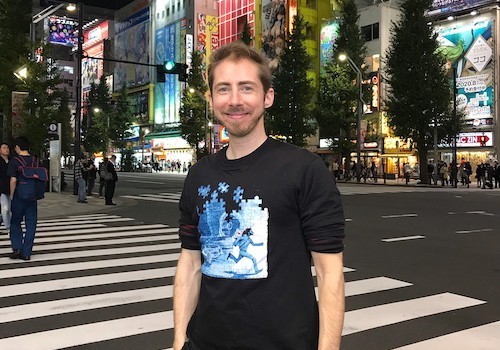
We feel super lucky here at NaNo HQ to be able to work with some excellent interns! Today, meet our newest Editorial Intern, Jordan Leigh. You’ll be getting to know him better throughout Camp, but today he’s here to tell you a little about himself:
In the third grade I wrote and illustrated the dramatic tale of a little child who wanted a horse because I was a little child who wanted a horse. Several adults applauded this apparently unparalleled ingenuity and told me that I should be a writer. I just wanted a horse.
In the fifth grade I wrote and illustrated the story of a little mermaid because I really loved to swim. The adults heaped praise on my derivative originality and told me that I should be a writer. I really just wanted to be a fish.
In the tenth grade I wrote about being stranded on a deserted island because every child knows instinctively that this would be the pinnacle of grand adventure. My teacher expressed amazement at my description of eating a coconut, which I had never eaten before, and told me that I should be a writer. I really just wanted an island. And a coconut.
The truth was, I had a dark secret: I knew that I could never be a writer. No matter what anyone said, what they didn’t know was that I found the writing process to be painstakingly difficult. So I decided to be an animator. I scarpered off to animation school just as the industry pulled the rug of hand-drawn animation out from under me and married itself indefinitely to 3D modeling. Also it was a for-profit school that broke its promises, so I annulled my vows and absconded to L.A. But that is another adventure.
One fateful day as I was muddling through a tricky bit of computer code and found myself rather relishing the interminable ordeal, a little incandescent lightbulb appeared over my head and miraculously illuminated itself. In that moment I knew that I was, had been, and would always be cursed to reside in the inescapable glow of a writer’s halo. But a writer, nonetheless. Because things being easy aren’t always the same as things being agreeable or intended.
Although I’ve yet to acquire my gills, I grew up to be a gender-centaur, sometimes called a unicorn, who keeps company with small tigers and draws comics. I am also widely regarded as the best story-slinger this side of the living room couch by anyone who listens to me, and occasionally don that brassy badge as the acting Editorial Intern for this here town of WriMo. So let’s get writing!
Chris Baty's Blog
- Chris Baty's profile
- 63 followers



